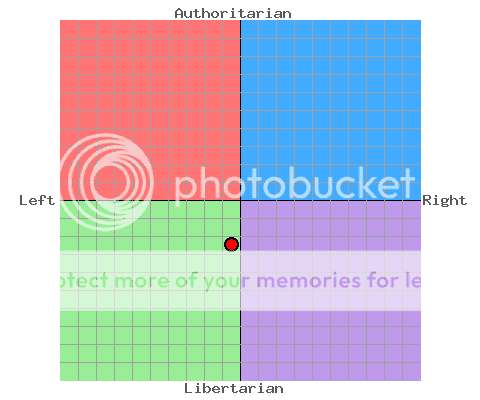'Character is both developed and revealed by tests, and all of life is a test.' anon
Close to Gandhi and Stewart Alexander, libertarian left section, green
Economic Left/Right: -5.38
Social Libertarian/Authoritarian: -2.56
Similar tests to above. Nolan Chart Survey - and - OkCupid | The Politics Test
This is a fascinating test. "Can your beliefs about religion make it across our intellectual battleground?' Battleground God
Various tests and games: Games and Interactive Activities
This topic has always interested me, first posted here: http://www.usmessageboard.com/conspiracy-theories/95300-serious-conspiracy-theorist-question.html
Left Right* Hemisphere Brain Processing
Right Brain vs Left Brain Creativity Test at The Art Institute of Vancouver
Close to Gandhi and Stewart Alexander, libertarian left section, green
Economic Left/Right: -5.38
Social Libertarian/Authoritarian: -2.56
Similar tests to above. Nolan Chart Survey - and - OkCupid | The Politics Test
This is a fascinating test. "Can your beliefs about religion make it across our intellectual battleground?' Battleground God
Various tests and games: Games and Interactive Activities
This topic has always interested me, first posted here: http://www.usmessageboard.com/conspiracy-theories/95300-serious-conspiracy-theorist-question.html
Left Right* Hemisphere Brain Processing
Right Brain vs Left Brain Creativity Test at The Art Institute of Vancouver



